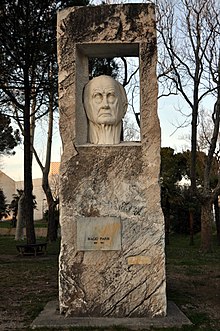Biagio Marin
Biagio Marin (born June 29, 1891 in Grado , † December 24, 1985 ibid) was an Italian poet. He has become very well known throughout Italy, primarily because of his poems written in the Grades dialect . He also wrote many poetry in Italian and German .
Life
Biagio Marin was born on June 29, 1891 in Grado, which at that time still belonged to the Austro-Hungarian monarchy . Since his mother died in his childhood, Biagio Marin was mainly raised by his grandmother. He attended the state grammar school in Gorizia , which taught bilingually in Italian and German. There he began to write his first literary texts in German and Italian.
In 1911 he began to study in Florence . During his studies he met Scipio Slataper , Umberto Saba and Virgilio Giotti. With them he belonged to the circle of authors of the newspaper La Voce . In this newspaper Biagio Marin published his first poems and poetry on Gradesisch ( Graisan ). After only one year in Florence, he moved to Vienna , where he studied philosophy for two years . But after 2 years in Vienna he returned to Florence. There he married Pina Marini in 1914. After the events of Sarajevo , Biagio Marin was drafted into the Italian army. In Maribor he fought against the Austrian troops. During these fights he became infected with tuberculosis . After the end of the war, Marin took up his philosophy studies again, which he finished with a doctorate in Rome .
After his studies, he taught philosophy at the Scuola Magistrale in Gorizia, which he left after a dispute with the local clergy. Biagio Marin then worked for 14 years as director of the Grado Spa and Spa Society. From 1938 to 1941 he worked as a teacher for literature, philosophy and history in Trieste . In 1941 he gave up his teaching post to take up the post of librarian of the Assicurazioni Generali in Trieste. He held this office until 1956. On July 25, 1943, his son Falco Marin died in Slovenia during World War II .
In 1968 Biagio Marin retired to his house on the beach in Grado. During this time he devoted himself more intensively to his poetry. However, his eyesight deteriorated only shortly after returning to Grado, and so Biagio Marin was almost completely blind and deaf until his death. In 1982 he was awarded an Antonio Feltrinelli Prize .
Biagio Marin died on December 24, 1985 in Grado. He bequeathed his private library to the Grado City Library.
Works
Biagio Marin wrote his poetry and stories in Grado, a dialect spoken almost exclusively in Grado. However, he wrote many of his works bilingually, as he spoke fluent German. Many of his works deal with daily life and the landscape near Grado. He was inspired by the sea, which plays a major role in his works.
Biagio Marin has received numerous literary prizes for his works. The most famous awards are the Bagutta and the Viareggio. In 1981 Biagio Marin was nominated for the Nobel Prize in Literature .
The town hall square ( Piazza Biagio Marin ) and the auditorium ( Auditorio Biagio Marin ) bear his name in his honor.
Poetry
- Fiuri de tapo, 1912
- La girlanda de gno suore, 1922
- Canzone piccole, 1927
- I canti de l'Isola, 1951
- Sénere colde, 1953
- Trìstessa de la sera, 1957
- L'estadela de S. Martin, 1958
- El fogo del ponente, 1959
- Solitàe, a cura di PP Pasolini, 1961
- I mesi dell'anno, 1961
- 12 poetry, 1962
- Elegìe istriane, 1963
- Il non tempo del mare, 1912-1962, 1964 Premio Bagutta (1965)
- Dopo la longa ìstae, 1965
- Elogio delle conchiglie, 1965
- La poesia è un dono, 1966
- E! mar de l'eterno, 1967
- Quanto più moro, 1969
- La vose de le scusse, 1969
- El picolo nio, 1969
- La vita xe fiama. Poetry 1963-1969, 1970
- I canti de l'Isola, 1912-1969, 1970
- Le litanie de la Madona, 1970
- El vento de l'Eterno se fa teso, 1974
- A sol calao, 1974
- El crìtoleo del corpo fracasao, 1976
- Pan de pura farina, 1977
- Stele cagiùe, 1977
- In memoria, 1978
- Nel silenzio più teso, 1980
- E anche il vento tase, 1982
- La vose de la sera, 1985
prose
- Grado l'isola d'oro, 1955
- Gorizìa la città mutilata, 1956
- I delfini - Slataper, 1965
- Strade e rive di Trieste, 1967
literature
- Biagio Marin: In memoria / The wind of eternity gets stronger . Urs Engeler Editor, 1999, ISBN 978-3-905591-08-8 (collection of poems that was translated from Grades into German).
- Biagio Marin: Grado, the island blessed by God . Ed .: Marina Bressan. Edizioni della Laguna, ISBN 88-8345-003-5 (compilation of poems and prose from L'isola d'oro, as well as from other works by Biagio Marin).
Web links
Individual evidence
- ^ Ermanno Krumm, Tiziano Rossi: Poesia italiana del Novecento. Banca popolare di Milano, Milan 1997.
- ↑ a b c d e f g Short biography and reviews of works by Biagio Marin at perlentaucher.de
- ↑ Marin. In memoria / The wind of eternity is getting stronger. Urs Engeler publishing house, 1999 (in degrees and in German).
| personal data | |
|---|---|
| SURNAME | Marin, Biagio |
| BRIEF DESCRIPTION | Italian poet |
| DATE OF BIRTH | June 29, 1891 |
| PLACE OF BIRTH | Grado |
| DATE OF DEATH | December 24, 1985 |
| Place of death | Grado |
